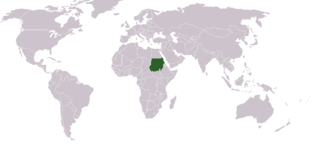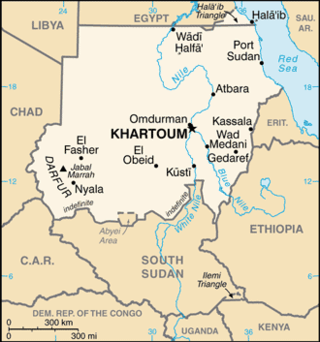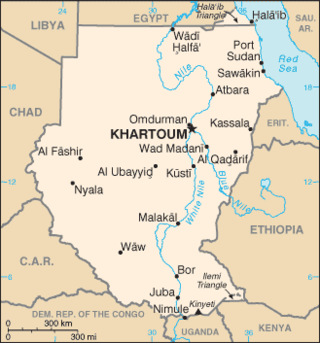Sudanese coup d'état may refer to:

Currently, the politics of Sudan takes place in the framework of a federal provisional government. Previously, a president was head of state, head of government, and commander-in-chief of the Sudanese Armed Forces in a de jure multi-party system. Legislative power was officially vested in both the government and in the two chambers, the National Assembly (lower) and the Council of States (higher), of the bicameral National Legislature. The judiciary is independent and obtained by the Constitutional Court. However, following a deadly civil war and the still ongoing genocide in Darfur, Sudan was widely recognized as a totalitarian state where all effective political power was held by President Omar al-Bashir and his National Congress Party (NCP). However, al-Bashir and the NCP were ousted in a military coup which occurred on April 11, 2019. The government of Sudan was then led by the Transitional Military Council or TMC. On 20 August 2019, the TMC dissolved giving its authority over to the Sovereignty Council of Sudan, who were planned to govern for 39 months until 2022, in the process of transitioning to democracy. However, the Sovereignty Council and the Sudanese government were dissolved in October 2021.

Jaafar Muhammad an-Nimeiry was a Sudanese politician who served as the fourth head of state of Sudan from 1969 to 1985, first as Chairman of the National Revolutionary Command Council and then as President.
The term Sudanese Civil War refers to at least two separate conflicts in Sudan in Northeast Africa:

Abdel Rahim Mohammed Hussein is a Sudanese politician and the former Governor of Khartoum State. Hussein served as the longstanding Minister of National Defense of The Republic of Sudan. Hussein also served for a period as the Minister of Interior Affairs. During his term as Minister of Interior Affairs, he opened the Rabat University. Hussein was arrested in early April 2019 following a coup on 11 April which overthrew al-Bashir.

The Sudanese Communist Party is a communist party in Sudan. Founded in 1946, it was a major force in Sudanese politics in the early post-independence years, and was one of the two most influential communist parties in the Arab world, the other being the Iraqi Communist Party.

The 2004 Chadian coup d'état attempt was an attempted coup d'état against the Chadian President Idriss Déby that was foiled on the night of May 16, 2004.

The following outline is provided as an overview of and topical guide to Sudan:
May Coup may refer to:

The 1969 Sudanese coup d'état was a successful coup, led by Colonel Gaafar Nimeiry, against the government of President Ismail al-Azhari. The coup signaled the end of Sudan's second democratic era, and saw the beginning of Nimeiry's 16 year rule.
The 1977 Sudanese Juba coup d'état attempt was an unsuccessful coup, led by 12 Air Force members who had previously been members of Anyanya. The exact specifications of the coup attempt vary, although tend to focus on a failed attempt by the group to take the Juba airport.
The Transitional Military Council (TMC) was the military junta governing Sudan that was established on 11 April 2019, after the 2019 Sudanese coup d'état that took place during the Sudanese Revolution, and was formally headed by Abdel Fattah al-Burhan, Inspector of the Armed Forces, after Ahmed Awad Ibn Auf resigned as leader one day following the coup.

The Transitional Sovereignty Council is the collective head of state of Sudan, formed on 20 August 2019, by the August 2019 Draft Constitutional Declaration. It was dissolved by Chairman Abdel Fattah al-Burhan in the October 2021 Sudanese coup d'état and reconstituted the following month with new membership, effectively changing it from a unity government to a military junta.
The 1990 Sudanese coup d'état attempt was a bloodless coup attempt which took place in Sudan on 23 April 1990. Reportedly orchestrated by two retired Armed Forces officers, Major General Abdul Gadir al Kadaru and Brigadier Mohamed Osman Karrar, and planned by junior officers loyal to them, the coup attempt was directed against the RCCNS, the ruling military junta led by Lieutenant General Omar al-Bashir.

The 2012 Sudanese coup d'état attempt was a coup d'état attempt on 22 November 2012 in Sudan against president Omar al-Bashir, who took power in the 1989 Sudanese coup d'état. It started as an attempt to overthrow the government over serious conflicts, upheavals and worsening conditions. 13 were arrested during the coup attempt, according to the media.

The 2004 Sudanese coup attempt was a coup d'état attempt in Sudan in March 2004 against the president Omar al-Bashir and his cabinet, inspired by opposition leaders and Hassan Al-Turabi. It ended with the arrests of army officers over the next few days. A second attempted coup was staged in September 2004.
The September 2021 Sudanese coup d'état attempt was a coup attempt against the Sovereignty Council of Sudan on Tuesday 21 September 2021.

On 25 October 2021, the Sudanese military, led by General Abdel Fattah al-Burhan, took control of the Government of Sudan in a military coup. At least five senior government figures were initially detained. Civilian Prime Minister Abdalla Hamdok refused to declare support for the coup and on 25 October called for popular resistance; he was confined to house arrest on 26 October. Internet outages were reported. Later the same day, the Sovereignty Council was dissolved, a state of emergency was put in place, and a majority of the Hamdok Cabinet and a number of pro-government supporters were arrested. As of 5 November 2021, the list of those detained included "government ministers, members of political parties, lawyers, civil society activists, journalists, human rights defenders, and protest leaders", who were held in secret locations, without access to their families or lawyers.
Sudanese Sovereignty Council, or Supreme Commission or Commission of Sovereignty, is a presidential council in Sudan that was formed for the first time in 1955. Since then, it has been dissolved and reconstituted more than once. Its most famous councils may refers to: